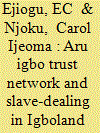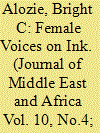|
|
|
Sort Order |
|
|
|
Items / Page
|
|
|
|
|
|
|
| Srl | Item |
| 1 |
ID:
153106


|
|
|
|
|
| Summary/Abstract |
Although existing research on trust networks shows that ethnic networks, for example, have sustained long-distance trade from the origins of cities and states onward, this article reveals that, even in the absence of connections to cities and states, by their nature and because of their commitment component, trust networks can also be uniquely customized and made to lend themselves to the peculiar enterprise that was slave-dealing in Igboland, even in contexts that are devoid of cities and states and their governmental trappings. This assertion about trust networks is substantiated in the article with an account of the effectiveness of the Aru Igbo trust network, which enabled the extensive participation of the Aru1 Igbo in the slave trade in the lower southeast Niger basin. Also, the article taps into Charles Tilly’s theoretical formulation on error correction to demonstrate that, in spite of the error, correction measures adopted by the abolitionist campaigners to bolster the purposive action that characterized the initial phase of their campaign, slave-dealing and trade in Igboland and in the lower southeast were sustained in spite of all that largely because of the durability and resilience of the Aru Igbo trust network.
|
|
|
|
|
|
|
|
|
|
|
|
|
|
|
|
| 2 |
ID:
169990


|
|
|
|
|
| Summary/Abstract |
While historians have, of course, employed a host of documentary sources in reconstructing the colonial history of Nigeria, few have used petitions to understand the dynamic negotiations that occurred between the colonizer and the colonized. As a result, a vital primary source of history has been underutilized. Likewise, the voices of women lamentably have suffered the same fate as the use of petitions. This study seeks to fill this important gap by examining selected petitions and written correspondence between Igbo women and British officials in the period from 1892 to 1960. Continuously undermined by male-dominated colonial institutions and structures, African women acted in varied and complex manners from subtle to overt opposition, and sometimes violent resistance. One response was through petition-writing as women took to the pen to articulate their concerns. Petitioning became both a disabling and enabling force in exploring the relationship between subjectivity and power relations. How are scholars to understand the interactions between the often-neglected, ordinary female subjects and the British authorities? To what extent did their petitions shift the balance of patriarchal power and give voice to the otherwise “silent” women? Analysis of petitions written by women in colonial Igboland demonstrates how petition-writing gave females a subtle yet powerful voice, or agency, in a rigidly hierarchical colonial political system. This study argues that instead of simply looking at these petitions as another set of documents, they should be regarded as unique sources in which colonial subjects’ thoughts and desires are revealed. In addition, these neglected sources should be treated as an integral part of the complex power politics among colonial subjects as well as between them and officials. In thinking through these petitions, this case study reframes the sexual politics of petitions and challenges dominant, institutionalized gender ideologies that have defined women as nearly powerless and passive.
|
|
|
|
|
|
|
|
|
|
|
|
|
|
|
|
|
|
|
|
|